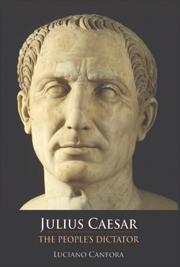Book contents
- Frontmatter
- Contents
- Translators' Note
- Acknowledgements
- Foreword
- PART I FROM SULLA TO CATILINE
- PART II FROM THE TRIUMVIRATE TO THE CONQUEST OF GAUL
- PART III THE LONG CIVIL WAR
- 16 Towards the Crisis
- 17 Striving after Tyranny?
- 18 Attacking the World with Five Cohorts
- 19 Caesar's ‘Programme’: In Search of Consensus
- 20 ‘Amicitia’
- 21 From the Rubicon to Pharsalus
- 22 Against Subversion
- 23 Alexandria
- 24 Caesar Saved by the Jews
- 25 From Syria to Zela
- 26 The Long Civil War
- 27 The Shoot of a Palm Tree: The Young Octavius Emerges
- 28 ‘Anticato’
- PART IV FROM THE CONSPIRACY TO THE TRIUMPH OF CAESARISM
- Chronology
- Bibliography
- Index
26 - The Long Civil War
from PART III - THE LONG CIVIL WAR
Published online by Cambridge University Press: 05 August 2013
- Frontmatter
- Contents
- Translators' Note
- Acknowledgements
- Foreword
- PART I FROM SULLA TO CATILINE
- PART II FROM THE TRIUMVIRATE TO THE CONQUEST OF GAUL
- PART III THE LONG CIVIL WAR
- 16 Towards the Crisis
- 17 Striving after Tyranny?
- 18 Attacking the World with Five Cohorts
- 19 Caesar's ‘Programme’: In Search of Consensus
- 20 ‘Amicitia’
- 21 From the Rubicon to Pharsalus
- 22 Against Subversion
- 23 Alexandria
- 24 Caesar Saved by the Jews
- 25 From Syria to Zela
- 26 The Long Civil War
- 27 The Shoot of a Palm Tree: The Young Octavius Emerges
- 28 ‘Anticato’
- PART IV FROM THE CONSPIRACY TO THE TRIUMPH OF CAESARISM
- Chronology
- Bibliography
- Index
Summary
Il a été six mois maître du monde.
NapoleonOne could argue that the reason the civil war did not end at Pharsalus was precisely because Pompey died so unexpectedly. The distinguishing feature of this civil war, different from all the others between the first century bc and the third century ad, was that it never ended. The forces in the field remained in balance, neither side able to achieve conclusive military success. For Caesar, the most urgent imperative each time was to achieve decisive victory on the field of battle, and, immediately or at the same time, to seek a political solution that would re-establish the balance of power. Hence his policy of clementia, and hence his chosen solution: ‘Caesarism’ (dictatorship) plus accord with the aristocracy.
Napoleon's apparently paradoxical observation was well aimed. The ‘six months’ are those between the return to Rome after the very difficult and protracted Munda campaign against Pompey's sons (the end of August 45 bc) and the fatal attack of 15 March 44. Napoleon saw the civil war as a unique, uninterrupted and long-drawn-out conflict that began at the end of December 50 and ended (if this term is not too optimistic) with the conclusion of the Spanish campaign, in the late summer of 45. In the middle there were very brief intervals. At the beginning of October 47 Caesar returned to Rome from the East, after the series of battles at Pharsalus, Alexandria and Zela, but by the beginning of December he was already leaving for Africa, setting out from Lilybaeum, to confront the ‘republican’ forces that had regrouped in Tunisia under the protection of Juba, the king of Numidia.
- Type
- Chapter
- Information
- Julius CaesarThe People's Dictator, pp. 229 - 244Publisher: Edinburgh University PressPrint publication year: 2007



